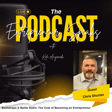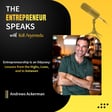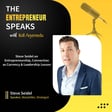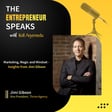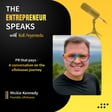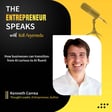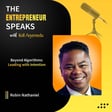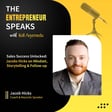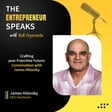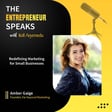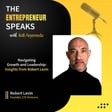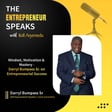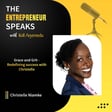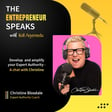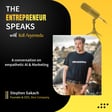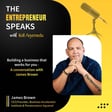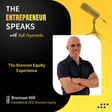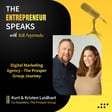Opportunities vs. Excuses
00:00:00
Speaker
Well, I'll keep it pretty simple. Your ah in simple terms, your opportunity begins at the end of your excuses. All right, so you need to choose your heart. It's hard to be broke. It's hard to work a job 80 hours a week away from your family. It's hard to not necessarily see your way through the next opportunities. It's hard to be a business person to determining what level of risk you should be at in growth.
00:00:24
Speaker
There are different levels of hard. Choose whichever is hard for you. I mean, it's hard to be broke too, but it's just as hard to be in business and not figure out your way through it out of fear you might go broke. And that fear of resonating the concept back and forth drives so many people into just you know complacency and acquiescing decisions that they need to make.
00:00:43
Speaker
that they're not willing to make. And I would challenge anybody listening to this today, make those hard decisions and then work your way through the process. You are not going to know exactly how to mitigate or think your way around every next step, every next problem. What happens if I leave my job and it doesn't work? What happens if I deploy that capital and the product doesn't go? What happens if I hire that person and another wrong person? Work it out, solve the problems, get around it. That's what real business people opportunity begins at the end of your excuses. And by ah all goodness, at the end of this call, and for all things you could possibly have heard today, take some imperfect action, and something perfect will happen along the way. If you take no action, you will go nowhere.
Introduction to Entrepreneur Speaks
00:01:31
Speaker
Welcome to the Entrepreneur Speaks podcast where I sit down with successful entrepreneurs and hear their stories from their biggest failures to their greatest successes. You get a behind the scenes look at what it really takes to make it as an entrepreneur. So come along for the ride and let's explore the entrepreneurial journey to get to.
00:01:54
Speaker
Welcome to this episode of the Entrepreneur Speaks podcast. My name is Kofi Animedou. Our guest today is Nel Tuar, the CEO of Voltage Holdings. He's passionate about helping entrepreneurs leverage platforms like Amazon, FBA, to build automated income streams, offering valuable insights on scaling businesses and creating sustainable revenue.
00:02:19
Speaker
In today's episode, we'll hear all about Neil's entrepreneurial journey. The lessons he's learned along the way, the challenges he's overcome, and how you can leverage some of the same strategies to build your own business empire. So whether you are looking to scale your own business, navigate the world of automation, or just hear from you from an inspiring leader, this episode is for you. Neil, welcome to the show. We are thrilled to have you here.
00:02:49
Speaker
Hey, Kofi, thanks for having me on. I appreciate it. All right. So thank you once again for joining us today.
Nel Tuar's Early Entrepreneurial Journey
00:02:55
Speaker
To start off our conversation, could you take us back to the beginning of your entrepreneurial journey and what initially sparked your interest in entrepreneurship?
00:03:04
Speaker
Well, mine goes all the way back to the days of ah mowing lawns in my neighborhood to make a little extra side hustle cash ah to kind of do the things I wanted to do and and you know buy some of the things I wanted to buy. My parents, my dad was a hardworking guy, worked 40, 50 hours a week on a swing shift at the at the plant there. and and Oregon, where I grew up as a kid, he was a hard-working guy. um But we we made it okay, and we got you know we didn't really need for anything. we just Anything I wanted, I couldn't really get because I couldn't ask for it, so I had to go get it. So as soon as I could push a lawnmower, I was out there shaking to make some money and kind of get the things I wanted, which started into that process of learning how to just you know make money and spend time. and
00:03:41
Speaker
You know build build concepts of of you know ah wealth and money and money creation as i was just sort of learning it, you know we didn't talk about money or wealth in our house profit was a four letter word we certainly didn't speak about it a lot because it would disrespect that. I'm gonna always make i'm feeling adequate so we didn't talk and mom made sure we didn't talk about it so i never really had the basis of money and keeping money and managing money at all.
00:04:03
Speaker
ah So later on as i learned about money and started in the process of growing and developing i really got interested in passion about e-commerce and the online world of leads and generation and product and development and digital assets and all that stuff and.
Transition to Corporate and Beyond
00:04:17
Speaker
While the the internet was coming online i actually had to ride through the corporate world for a while um because the internet was moving so fast and nobody really knew what to do when there was no.
00:04:26
Speaker
university education that could take you through that learning curve. You just had to be on the job or somewhere um in the tech space learning how to do it ah because there was certainly no place to go get educated other than hands-on experience, which led me through, you know, a years of corporate nonsense in order to gain that experience. And by the time I got to 2007, I was sort of done with that because I always really wanted to do my own thing and had a little side hustle doing my own thing. and Hope to originally graduate that into my full-time business and in 2007 when I had reached my corporate into my corporate career at IBM It was a good ride. It was a fun ride and learned a lot like a lot of connections learned a lot about the world of high-end business I jumped out and did my own thing burn to the boats and kept going didn't burn the bridges because a year later as I was developing my own business and pipeline and I was doing management and computer and I knowledge management consulting and the and technology consulting, they called up and said, hey, we got a project for you. So that was cool. um Because at that point, I got to name my rate. And when I said, hey, I want 250 an hour, they went for it. So then I was in into management consulting for a little while and building that company. And I got a number of people I hired a mentor to kind of help me expand my mind and my business because I really had been in the corporate world so long that I didn't really understand what it meant to be an entrepreneur. So I hired a
Mentorship and Business Fundamentals
00:05:39
Speaker
I started working with them in his business and he really taught me the principles of selling and fundamentals of business and operating cash flow and accounting and kind of that you know the basics of really managing a company. And he helped me see that from the inside out. and And with that, I really kind of started to expand my mind and got into more online marketing in 2009 or so in and the mobile space did really well with lead generation and media buy.
Shift to Private Labeling
00:06:03
Speaker
And I was doing it for affiliate based marketing and products. What I realized though that is I didn't control the end product and I wanted to control the outcome. And so I got into the business of of private labeling products after taking some time to flip products.
00:06:17
Speaker
and doing an arbitrage game, a buy low, sell high kind of game, and figured out how to love for that. I really liked having the physical product. I liked the digital component I came from, and I liked the product that I could actually own. and So then I went into private labeling, which was having the product manufactured for me, created in my business under my intellectual property.
00:06:35
Speaker
and have been there for more than 11 years now. um I fell in love with branding and product and the physical product world and that's what I've been doing for
E-Commerce Expansion
00:06:43
Speaker
a long time. I started on the Amazon FBA channel and then learned how to do Shopify and then TikTok marketing and other channels of operation and have expanded out you know beyond Amazon FBA since then. So that's kind of a quick and dirty of of my entrepreneurial journey, if you will. All right, so thank you. So all you know, how long have you been an entrepreneur?
00:07:04
Speaker
Well, I mean, you know, I had a side hustle business running a game server company during my end of sprint years in my IBM years, I was actually playing online as the handle zero density and I was winning tournaments and playing games before you got to twitch and YouTube and everything else. It was is all the online world and I started a game server company that is.
00:07:22
Speaker
hosting these audio codecs so people could talk in a multiplayer format because it wasn't built into the games yet. Can you believe that? And it certainly wasn't as advanced as mobile technology is now ah when you play like Call of Duty mobile and all this stuff. So I got out of it after leaving the IBM, but um always had an interest in it. So I would say early 2000, but 2007 is really when I left and went full, you know, on my own. And and so I was about 17 years now into this run.
00:07:49
Speaker
All right. So you've been at this for quite some time now. So touch on your pieces of experience and also get to learn a lot from you today. So I'm sure along the way, you you you've no doubt faced some
The Tenacity of Entrepreneurship
00:08:05
Speaker
ups and downs. looking oh for yeah yes yes yes yes yes yes Looking back, what were some of the most important lessons you learned earlier in your career and and and how is this shaping your business decisions today?
00:08:20
Speaker
Well, I mean, at the end of the day, here's what I learned about significant success in entrepreneurialism and the people around me who I've come to know. And as you you grow and go in business at certain levels of business and, in you know, money making and socioeconomic, you kind of the narrow list of people you know in business and trust kind of gets smaller and smaller as you as you go up. And as you learn more from these folks and understanding, there's a similar um tenacity, perseverance. They don't take No for an answer everything's a kno w that can be negotiated um until it's a hell no and at a hell no it's not dead until it's completely dead. And so they are somebody who is always solving problems they've gotten good at solving problems they have a much higher ah threshold of risk tolerance than the average joe they typically are in the top two to five percent of those who are constantly having a sense of urgency a go go go do do kind of thing while they still understand the freedom of time and business they are always pushing.
00:09:14
Speaker
The boundaries, they're always jumping off cliffs. They're always continually thinking of new things to move on and yeah always adapting and changing what's working and seeing if it can be done better. And as it turns out, that is sort of a conditional learning of my challenges and you know issues I faced in the past.
00:09:31
Speaker
that I ran into and forced me to become that kind of person in that mindset. I wasn't born that way. I wasn't raised into
Risk-Taking in Entrepreneurship
00:09:38
Speaker
that way. I became conditioned through hardship and experience to be an executor who was willing to fill this room you see with failures so that I could brag about the 2% of the time I actually had success.
00:09:50
Speaker
because the rest of it has been continual failures and things that came to dead ends and marketing tactics that didn't work and product lines that didn't launch and businesses that failed and relationships and business that failed and the businesses themselves that failed and even went into legal issues and i frankly realize that anybody who's been serious about risk and business has been sued and if you haven't been sued then you probably haven't pushed the boundaries of risk yet.
00:10:14
Speaker
If you haven't gone and failed enough that you went bankrupt once, you probably haven't pushed the risks and boundaries yet and don't know what your true boundaries of risk are. And if you've done that, and I have, then you really know what you're made of and how far you're willing to push these opportunities, these goals, these objectives. And if you can't say that you haven't tried or pushed hard enough to reach those goals, if you haven't put your entire payroll on a credit card yet, you probably haven't risk. I'm starting to sound like Jeff Foxworthy in that thing where he's like, you might be a redneck if.
00:10:42
Speaker
this is like you might be an entrepreneurial in person if you ever push the boundaries of risk everybody wants up in the safety net everybody wants the thousand dollar program that makes them a million dollars nobody wants to risk you know the ten twenty million dollars in capital it takes to start a business and build multi seven eight figures.
00:10:58
Speaker
they want a lot for nothing. I call it the hopium lottery mindset mentality. And when you get to the level of business I'm doing now and the people that I'm surrounded by, my business partners and the ones that I know, they're very pragmatic about levels of risk. And they realize that now they were usually thinking small that abundance is literally everywhere, even if it's not next to you right now, it's out there and you can see it flow and you just don't know how to get to it yet because it's not near you. Doesn't mean it doesn't exist.
00:11:26
Speaker
And more often than not, the gap between it not existing and existing is between your ears. And at the end of the day, depending upon what kind of business you were after, real estate, e-commerce, digital marketing, affiliate marketing, arbitrage or private label is usually your willingness to risk that will gain and create abundance or limit and create scarcity belief.
Voltage Holdings as a Startup Incubator
00:11:46
Speaker
All right. So you are the CEO of voltage holdings. So tell us a bit more about your company and what exactly you do in your company.
00:11:54
Speaker
Yeah, so it's a holding company by its definition because it has multiple entities that are underneath it. The different entities are data entities for our software and SAS ah platform. There are consulting and mentoring, ah coaching groups. There are businesses that we've acquired and and brands that we have created. And there are companies that we work with as operational providers ah for companies that were acquired that we are working through the process of acquiring or developing and run operationally as part of our responsibility to the business.
00:12:23
Speaker
businesses we have interest, invested interest in, okay? So, voltage itself really is an incubator of businesses in the startup phase or the growing phase. We are also the opportunity for optimization to exit and then we are also acquisition partners in businesses that are being acquired for growth.
00:12:41
Speaker
Okay, so so one area where a lot of entrepreneurs are seeing success is Amazon FBA.
Amazon FBA Strategy
00:12:48
Speaker
And you've been involved in various entrepreneur ventures over the years. How do you see Amazon FBA as a potential way for entrepreneurs to build automated investing?
00:13:00
Speaker
So about five to seven years ago, getting started in flipping products, wholesale, retail, online arbitrage was a great opportunity for Amazon. Whether you were putting in them in the FBM channel, which means you were selling it yourself, or you were putting it into FBA and arbitraging it, it was low restriction. Amazon was okay with it. It was big market opportunity.
00:13:18
Speaker
Fast forward to this year, it's not. okay This year and last year, and I've been talking about this for the years prior, is a pivotable change in which the marketplace is now lower 60% of the sellers on Amazon are now Chinese sellers. So if you're going to compete in the market, you must compete as a private-label brand. You must move yourself above the idea that you can compete on twenty dollar products and amazon or in the marketplace with teamu shine all express amazon hall and these other low-cost manufacturers that are moving from off you know amazon off america and onto america platform and using our platforms to basically move their manufactured products you can't compete with them at that level what you can compete at is branding you can out brand them outmaneuver them and out narrative them.
00:14:04
Speaker
If you're in those other business markets, you're going to see yourself fall in the marketplaces right now, stopping people from doing that. They don't want that in their system. They want to control it through their own mechanism, so they're stopping third-party sellers from doing it. Now, there's a lot of, you know, America First app happening right now, and I'm curious to see how that works as TikTok was being taken offline to remove its Chinese influences. I wonder how many of these other platforms are next, okay? With unfair practices from Amazon allowing Chinese sellers on too much,
00:14:33
Speaker
We don't play in the $30 or less retail price point for that reason and neither should you. If you're going to get in the market, you need to be in the $50 to $500 retail price point range. You need to come in as a brand, you need to capitalize as a brand, and then you can out-compete, out-maneuver and out-IP the Chinese sellers that are in the marketplace. With that, it's a huge opportunity for new sellers who want to get involved in private label. You just need to get involved with the right expectations of what we call the time, energy, attention and money time, energy, attention and money or the team effort really required to make this work. You, the team, the money, the capital, maybe consulting and partners of ah coaching to help you. And of course, the marketplace, the systems and technologies and manufacturers are going to need to make it all work. Okay.
Amazon as a Launchpad
00:15:18
Speaker
It's a little more advanced. It's a little more sophisticated. if It's not a side hustle or a hobby business anymore. If you try to get that running, you're going to get closed down relatively fast now because they don't want you on that platform. They're making it very difficult for you to get involved. Anybody selling courses and programs, talking about you know make money opportunities on Amazon FBA, are basically selling the money and the courses knowing that Most of the operators are going to get rejected if they are not building a brand asset if they're not building an LLC if they're not building The necessary assets and brands for Amazon to even approve them on the platform and once they're approved they're easily shut down they're easily destroyed in the marketplace by counterfeits and Hijackers because they have no defense mechanism in place. They don't have any trademarks. They don't have any brand registration in place They don't have the assets necessary and they get hurt by it.
00:16:04
Speaker
So what I'm making sure people understand is if if Amazon is going to be your first channel and I tell you for many new people, it is a wonderful channel to start with because it's solving a big problem. Sales fixes everything, right? Which means I need people to see my offer and Amazon's a great place for people to actually see your offer who want to buy things, okay?
00:16:22
Speaker
That's a great place for you to start off with. And with the fulfilled by Amazon side, which delivers the products to the customer and helps with the customer retention, helps with the operations, helps with the backend ah support of the product, that puts you in a position to do exactly what you should be doing, which was selling and marketing to the system itself.
Balancing Risk and Growth on Amazon
00:16:42
Speaker
okay You're not selling and marketing to the person who's buying the product, you're actually selling and marketing to an AI engine. And many people don't get this or understand it. And that's a long-winded answer to say that there is huge upside, there is double-digit growth, but there are also risks and cons to be very pragmatic about what it takes to make it that upside potential and that success, especially in the coming year.
00:17:03
Speaker
All right. So my guest once again is Nel Tua. He's a CEO of Voltage Holdings. Let's break down our mission on Amazon FBA into a little bit more detail. So for someone, for example, who's just starting with Amazon FBA, what are the most important steps to take in order to build a sustainable and a more scalable business? Yeah. I mean, first it starts with conditioning your brain away from consumerism and into a product selling marketer.
00:17:31
Speaker
You have to move out of the idea of, well I wouldn't consume this product so nobody wants to buy it. And you need to move into the, am I seeing that somebody wants this product? It answers and fulfills the question, what the heck do I sell? And if I can start seeing the pattern of this product in the marketplace, then really what I need to determine next as I determine a list of product ideas is really, what are the numbers? what We go by the numbers to actually determine, ah like a true marketing you know seven, eight figure seller, is it profitable? Is there a market? Is there upside potential? Is there competition with no saturation? And if I sell a unit of this, can I make it profitable? And if all those numbers are yes, then I should test a unit market ah share. I should go out and you know try and sell 100 units of that product to see if I can even sell it.
00:18:19
Speaker
So when i test the marketplace i'm basically answering the question like a focus group did you like this product did you like that product did you like this product. At the end of the day it's only gonna be the products i test not the brands because i've already locked into a brand segment i'm going to go after the question is which product do they want to buy from me at what price point and how profitable is it gonna be for me to rank that organically and to get amazon ppc dialed in so i can set it up for growth.
00:18:45
Speaker
When I have those numbers tested back, okay, we launch five products, we go buy those numbers, test those five products, we get the data back and then we make intelligent data driven decisions. The one thing we don't do is ever marry the product. Okay, so many people will go out and say, order 1000 units and just keep hammering and get your social media after that and do all these things and you're going to make a million dollars. Well, that happens for like 1% of the people. What about the 99%?
00:19:11
Speaker
99% did not test the market well enough didn't understand who their customer really was and so when they created the listing images graphics and copy. They weren't speaking to the person who really wanted to buy that product and ultimately that was the problem not the product. Okay not the transactional aspect of the product because if you think about it they didn't actually get the product for two days later.
00:19:34
Speaker
So they didn't buy the product, did they? They bought the outcome belief of the solution and then people miss that. They don't understand how to communicate that. They're not direct marketers. They don't really know yet how to speak to that customer. They don't really understand yet the images and graphics and videos that are going to convince that person that this product is better than anybody else's. So they have to execute the steps of testing and validation.
Product Testing and Market Fit
00:19:58
Speaker
Go through the law of averages, which is five products will get one to two products that take off because you got it right. And through the process of learning, okay, similar to the way you would take somebody out who's who's a little kid who wants to ride a bike, you don't put them on a bike without training wheels. Everybody knows that, it's common sense. They ride the training wheels until you or them start to determine, I don't need the training wheels anymore. But I see so many people in business just run out to the bike and try to ride it and wonder why they get about five feet and fall over.
00:20:27
Speaker
right They don't understand there's a process of the learning of riding the bike that they have missed. They just wanted to get on the bike and ride it. Well, that's great. Everybody wants to do that. But you have to execute the steps. First, when you find one to two of those products, why did I get it right? Why did the copying images and graphics? Why is it this product? Why is it this color? Why is it this variation? and Notice again, we're in one brand, testing multiple products in one brand to determine what it is they want to buy from us. It's called relevancy.
00:20:56
Speaker
The relevancy of my product to the brand and creating hyper relevancy is getting it really dialed in so. The engine knows that it that someone who's a. 27 year old lady wants to buy a sippy cup from them OK and that I happen to sell a brand that's targeting moms that has products in it that target children that happens to be a sippy cup. Now I'm in relevancy I might even be in hyper relevancy at that point the engine is going to say hey show it to everybody who's relative to that let's see if they like it.
00:21:25
Speaker
And when they start to like it, I can obviously sell more of it. So with the data driven process of execution and going by the numbers and not marrying the products, I'm going to take testing that product until I find the winners. And then like any good retail or business of growth, I'm simply going to replicate that product and sell more of the same product.
00:21:46
Speaker
in the same packaging to more people. The same way there's an iPhone and an iPad and an iMac and a desktop and this. And then you buy one for your wife or your husband or significant other. And by this time you got like 10 devices, all Apple related in your house. This is the same process we go through, right? We sell more of the same product and different packaging. We capture more of the audience. Someone comes in and says, well, I don't really want the black one, but I see you got the white one. I'm gonna buy that one instead. Because I had that option out there available to buy it. And because it's hyper relevant, I'll sell more of it.
00:22:14
Speaker
Okay. And that is one way to unlock that big traffic filing system of Amazon or frankly, any algorithm, it's going to work very similar in many ways to having a Facebook marketing campaign that kicks off, having a YouTube campaign that kicks off, it's really dialing in, speaking to that avatar. And this is no different except one major component that I love in the traffic aspect.
00:22:34
Speaker
Amazon is an organic traffic engine and it has a PPC engine and together they work in unison and it's one of the only places in volume that that occurs online. So for new or mid-sized businesses or new people who want to sell, this is a great way to get organic traffic and sales and PPC traffic and sales and get them impacted in one location for opportunities of growth. And by the way, it's a system that does about 8,000 units ah plus a minute.
00:23:00
Speaker
over 8,000 units a minute. That means there is somebody on there who can buy your product. And sales fixes a lot of problems when you figure out how to get that in front of those people. Very interesting. ah You've been at this for quite some time now. So from your experience, what do you see as some of the biggest mistakes entrepreneurs make when trying to build an Amazon FBA business?
00:23:18
Speaker
Well, not just an Amazon business, but a
Expanding Sales Channels
00:23:20
Speaker
business in general. And then I'll talk about a couple things just specific to Amazon in terms of business building. Amazon is just a sales channel. It's not a business. Does it make Amazon itself FBI by itself does not make a business. It means you have a single sales channel that's doing really well.
00:23:33
Speaker
And you should now expand into multiple channels. Your own website, a Shopify store, TikTok shops, retail, Walmart dot.com, somewhere else you should move your product into market. Okay, it's very important because those are just multiple sales channels of an e-commerce business. So that's strategy number one.
00:23:49
Speaker
Start with one channel as we say in the country you can't ride two horses with one ass so pick one and if you don't know how to drive traffic and marketing through pay traffic media or social media start on amazon because it's already built into the cake baked into the cake as they say right. meaning There's a bunch of people who want to buy and you just need to get your product in front of us for beginners that's a great way to get going.
00:24:09
Speaker
The thing about amazon itself specifically that people make a mistake is they do not expect the time or capital requirements to be what they actually are.
Entrepreneurial Emotional Cycle
00:24:16
Speaker
They are oversold into the hope and the opportunity cost of what we call an emotional cycle of change which is beginning any new activity or whatever you're super excited you're ready to go and you want this thing to work and you're ready your body and let's go do it.
00:24:29
Speaker
And then you run into your first series of challenges, your first problem solving, your first difficulties. I can't get my Amazon and account approved for three tries, or I can't get my brand registration. This is my you know seventh try, and I still haven't been able to get them to approve my brand. And then you get down to where we call, hopefully, not the Valley of Despair, which is the bottom of that emotional cycle of change. The goal is to not allow your brain to get down to that point because you will sabotage the entire business.
00:24:56
Speaker
And you will make compromises out of time and then you will make mistakes in the capital deployment or so or moving product to market or buying things or spending things in the wrong way. You simply don't know what you don't know yet and experience is something you need to gain in that process. And that is something that I usually see most entrepreneurs are not doing
Support Systems in Business
00:25:17
Speaker
correctly. They have not got a support group.
00:25:19
Speaker
ah They've got got direct one-on-one accountability for what they're doing. They're typically operating as lone wolves or in a group consolidation where they're just one amongst a many group of people so they can't get their questions answered. or They don't know really what they don't know. They end up going off into small groups and trying to support each other and then they bad information but gets bad information.
00:25:39
Speaker
Garbage in garbage out they hear other people saying things are trying things and they don't really know and by that time they're completely confused as to what should actually be done accurately. What should i have done they get very confused when they can't get the fixing the last component of that is that they typically are so invested into it emotionally physically with time and money and other things.
00:25:57
Speaker
It becomes a bad relationship, becomes the enemy they know so they stay with it instead of changing it. So their risk level drops greatly, greatly, greatly and they stop doing the things they need to do and they only focus on what they can keep. And at that point desperation is kicked in and it's a failing situation all the way around.
00:26:14
Speaker
Okay, so yeah you've you've talked about the importance of systems and and processes in your submission. In your business, what role do these kind of systems and processes
Systems and Automation for Scaling
00:26:24
Speaker
play in your business? And and and how have you also leverage automation tools to create more free domain efficiency at voltage? Well, the first part of that question would be systems and processes to get a seven-figure branded company. You can drive a regular product business from zero to 100K. I've seen that.
00:26:41
Speaker
Thousands and even millions of Amazon people and e-commerce people have driven zero to 100,000 in sales. The ones that go from 100,000 to a million typically understood what they did successfully and then have built in or have through their mentorship or coaching or direct you know support the understanding of what standard operating procedures, SOPs, and what particular KPIs they should be following for the right growth metrics, the right profitability metrics, the right metrics of which the business can actually see repetitive actions that lead to additional revenues,
00:27:16
Speaker
while maintaining profitability. kind And that gets them to seven figures. So zero to 100 is just products, systems and operating procedures and metrics take you to a million. Without those, you won't get there. You won't know how to measure. And if you can't track and measure, you're not going to see the reward at the end of the day.
00:27:33
Speaker
So tracking and measuring in that is those SOPs. Knowing which process is due and which timeline to do them is a matter of repetition that creates experience from execution. And out of that experience, wisdom will tell you when and when not to do those things.
00:27:48
Speaker
Okay, you will not get to wisdom without the experience. End of story. And so many people want to jump right to that because they believe that's how they're going to make the money. They also believe they're going to make the money pushing buttons and tactical exercises that if I just mask activity with productivity, I'm going to make money or look popular.
00:28:05
Speaker
And that isn't going to happen. That isn't going to make you moment is a wrong revenue generate activities, we call them our GAs. Only the revenue generated activities that impact the bottom line are the one you should be focused on. And you will not know that without it the right experience, or executionable steps, you simply won't get there. Okay, so you've got to take those steps. And the second half of your question was regarding um I think it was growth. Forgive me, I answered the first one and kind of got off the second half. What was the second half of that question?
00:28:34
Speaker
and So so you've you've talked about um the systems and processes. My second part was asking how we can leverage automation tools to create. Yes, yes, yes. Leverage automation. Thank you for that clarification.
00:28:46
Speaker
um For example, when it's brand new and people don't want to hire warehouses or hire employees or get that, you know that's where we start people on the FBA channel because Fulfilled by Amazon is just a logistics and warehousing company at the end of the day.
00:29:02
Speaker
It allows the amazon dot.com to move products through that warehouse to the last mile to the customer and support the customer and their product purchasing. And it is Amazon's customer to be very clear. We're just leveraging that access and the data through their platform. We're getting access to that customer base.
00:29:17
Speaker
With that, we have built-in customer information systems, follow-ups, technology. They split test their funnel. They know exactly what makes them money. They're enhancing that warehouse and distribution system and the billions of dollars, which we're not spending. And they have the warehouses and people and fulfillment to do it for us. So we leverage that as part of our almost automated income.
00:29:36
Speaker
So I don't have warehouses and employees for certain most of my business ah because it's operated through that FBA channel. Now, if I go and have a successful run at a new brand on Amazon that's so you know getting high, six figures, seven figures, sees like it could make so you know multiple seven figures or even eight figures in time, okay then I see that I can open additional channels. If I go to Shopify, for example, I can connect the Shopify system to Amazon's FBA, and every time somebody orders on Shopify, it's fulfilled by Amazon.
00:30:06
Speaker
So then I just continue to focus on that new sales channel without having to worry about opening a you know additional infrastructure. It's ah called economies of scale. With this methodology, my economies of scale are much lower. If I go to TikTok shops and start selling and that starts to take off, I can have that fulfilled by Amazon. So I can create a spoken wheel system, a hub system that does allow me to open additional channels without creating complexity, opening warehouses, or even hiring more people.
00:30:31
Speaker
So Neil, you've been on this journey for a very long time and I'm sure like anything you've picked a lot of lessons.
Lessons in Sales and Financials
00:30:40
Speaker
Let's spend some time talking about the lessons you've picked up on this entrepreneurial journey. What useful lessons have you picked up and what would you like to tell my my my listeners and audience today? well The first one that i finally understood and was beaten into my head is there is obviously ethics and integrity in selling but sales fixes everything at the end of the day if you can sell a product or a service or even sell yourself. You are going to never want for money ever at the end of the day that's the number one sales thing you have to do and it comes with public speaking.
00:31:12
Speaker
and your ability to understand and talk educated wise about the business and its benefits. Talk about the accounting, the finance, or if it's physical products, the movement of physical products and goods, or the services of a SaaS company and its operations or consulting.
00:31:27
Speaker
with people or coaching. You need to be able to explain that in such a way as being able to get someone to build a know, like, and trust relationship with you. All right? So they're willing to buy something from you. At the end of the day, that's the number one skill set that most entrepreneurs face and one that they don't always do very well. Okay?
00:31:45
Speaker
Now, we're not talking about just selling something for the sake of selling something. We're not talking about desperate car and used car salesman type of tactics. What we're talking about is a confidence in knowing the business, having operated the business and then being able to speak to other people confidently about the business. A lot of people want to skip that middle step again and go straight into the idea, well, I can just sell anything. And some people can do that, but it's very small. Those who are natural born salesmen and can sell anything. and As the joke goes, they can sell ketchup popsicles to a person in an Eskimo. right ah So the the aspect of selling things is one and thing entrepreneurs face very difficult. They sell and difficulty in selling also means usually if they're self-driven or they're self um ah entrepreneurial in nature and they don't really have an infrastructure, they have to deliver the results themselves. So they tend to find themselves in the quagmire between selling and delivering.
00:32:36
Speaker
All right, because they don't always have a great infrastructure or a person to help them. If they're outselling, they're not delivering. And if they're delivering, they're not outselling, right? Again, riding two horses with one ass. You've got to sort of pick the one that is your biggest strength and the ones that are your weaknesses.
00:32:52
Speaker
You need to understand what the weakness is and why you can't do it. And then you need to find somebody who can do it. And that's all they're good at. That's what they love to do. That's their seat on the bus, if you will, to borrow that from good to great. And then they get to do that job, okay? The risk for you would be hiring the right person and paying them what's necessary to make sure that is done and that result is delivered so that you can focus on the sales if that's what you're really good at.
00:33:17
Speaker
but if you're not really good at the sales and you're great at the results let the results speak for themselves produce those results so that a sales person can come in and take them and then do what they're very good at which is selling the business. At the end of the day most business owners don't understand these things at the level or are not willing to risk what it takes to do.
00:33:35
Speaker
And they all also focus on things like accounting and finances which most people are not very good at and they need to hire the right people for the bookkeeping and then counting and finances and get into the right areas where they need to pay the right people to do that for them saving me more money is important
Capital Allocation Challenges
00:33:50
Speaker
filing in it correctly is important doing the due diligence and the light items is important booking it correctly is important creating a chart of accounts that runs the company correctly so i have a real profit and loss statement that tells me where i'm going and what i have to go with.
00:34:04
Speaker
Most entrepreneurs are not doing that correctly. They're running it as kind of a personal or a side hustle opportunity. They're not treating it like a real business. That's your you know top three things that entrepreneurs will typically face. And in that, they don't know how much capital has been. They don't understand how much they should spend. And that's really the third major failing point without the knowledge and the correct time application. They are usually under capitalized.
00:34:25
Speaker
We're just about wrapping up our conversation today. But looking to the future, and what are some of the major trends or opportunities that you see as essential for entrepreneurs to tap in? Well, if you are smart at the sales and you do have good operations and you're on the path of growth, acquisitions are always a great way to grow much faster, getting into the cash flow.
00:34:43
Speaker
buying up additional competing companies or complementary brands and services around you is very important. If you're just a coach, you should have some sort of service or SaaS-based offering behind you to ensure that you become a service provider, not just a consultant. okay If you're in the world of growth and business like we are in terms of building brands, we're now acquiring brands. We have a relationship with ah Patriot Growth Capital, um which is a veteran-backed, veteran-funded mission as a business.
00:35:10
Speaker
to support the veteran community through operational growth, CEOs, and even acquisitions of companies. They supported 16,000 veterans in their business last year in all areas of personal and and development and business. and Now through acquisitions, working with voltage, we are acquiring companies that are going to employ those veterans into that business and give them an operation experience, hire them in there, and even train them up as CEOs when appropriate to start running the companies and even acquiring them from us.
00:35:38
Speaker
ah later on. So it's a very business as a mission focus. We have set a big hairy ideas goal of acquiring 15 companies through that relationship this year. So we're heavily into the due diligence phase on a number of companies that are under intended to buy right now. um First one hopefully closing in the next month.
00:35:57
Speaker
And then that relationship is taking about 18 months to develop to this point. We've kissed about 200 frogs ah to find the first three that we're willing to actually negotiate a deal on. And so we're getting very close to those first deals takes a while. Patience and perseverance in business is extremely important, right? And with that, we hope we're making and believe we're making with some great strategic partners through acquisition.
00:36:17
Speaker
as we're growing that company through the next year. So entrepreneurs should be thinking about building and growth. Ecommerce is a double digit growth industry, one of the only ones right now. ah Hopefully that changes this year with a lot of opportunity, I believe people are feeling fully bullish right now. ah In America, I believe as business owners I've spoken to or wanting to deploy more capital and build bigger operations this year, which is the first time I've heard that in two to three, four years. So I'm very excited to hear that there are others that are out there doing kind of what we're doing, which is deploying capital into the market, which is going to be very important for entrepreneurial people to grow this company, and to grow the business of business in our country, which I'm excited about. So if you're getting started, you know, the year of ecom is now a pivotal changing year in 2025, where growth trajectory, I believe by 26 and 27 is going to change dramatically. For those who were involved now and get involved this year,
00:37:07
Speaker
And businesses that are in growth mode should really be looking at how do we take advantage of this coming curve by deploying capital and people to mission, getting it turned in this year for that opportunity as we sort of slingshot into 2026. But I think really tremendous upside in growth potential for anybody who is really going to hammer down on it this year, whether they're new, or they're expanding additional businesses or requiring new businesses.
Embracing Entrepreneurial Challenges
00:37:32
Speaker
um So we're just about wrapping up. What would be your piece of advice for an entrepreneur who's just a about starting business? Well, I'll keep it pretty simple. your ah In simple terms, your opportunity begins at the end of your excuses.
00:37:49
Speaker
All right. So you need to choose your hard. It's hard to be broke. It's hard to work a job 80 hours a week away from your family. It's hard to not necessarily see your way through the next opportunities. It's hard to be a business person determining what level of risk you should be at in growth. There are different levels of hard. Choose whichever is hard for you. I mean, it's hard to be broke too. But it's just as hard to be in business and not figure out your way through it out of fear you might go broke.
00:38:13
Speaker
and That fear of resonating the concept back and forth drive so many people into just you know complacency and acquiescing decisions that they need to make, um that they're not willing to make. and I would challenge anybody listening to this today, make those hard decisions and then work your way through the process. You are not going to know exactly how to mitigate or think your way around every next step, every next problem. What happens if I leave my job and it doesn't work? What happens if I deploy that capital and the product doesn't go? What happens if I hire that person, another wrong person?
00:38:43
Speaker
work it out, solve the problems, get around it. That's what real business people do. okay they They see problem solving as an opportunity. And it is every aspect of the business to solve problems, no matter what business you're in, you will solve problems. So again, opportunity begins at the end of your excuses. And by the all goodness, at the end of this call, and for all things you could possibly have heard today, take to some imperfect action, and something perfect will happen along the way. If you take no action, you will go nowhere.
00:39:12
Speaker
All right. Thank you. I'll still request for more advice. So let's look at an entrepreneur who's in business for some time. Let's say year one, year two, year three, who is currently facing a lot of challenges and is on the verge of giving up. What would be your piece of advice for such a person?
00:39:32
Speaker
In my experience, it's typically that they knew they should have done something in the past and they didn't do it. So they're kind of in regret mode and now they're in desperation mode trying to figure out what they should do to get back or go to the place they thought they were at. We call it moving from you know heaven ah Hell Island to Heaven Island and there's a lot of sharks and they don't know which robo to get in.
00:39:52
Speaker
Okay and they're trying to figure out how to get back to heaven island or get over to heaven island they can see it they know it exists they they know it's not far off maybe that marketing campaign isn't working it as well maybe things that were working last year and not working again they're trying to figure out how to pivot it maybe sales have decreased in certain areas and they're not sure how to regain that and so out of fear they're thinking well I don't know what I should do so I'll just hang on to what I've got.
00:40:13
Speaker
This is where the rubber meets the road. This is where it gets very difficult for businesses that are in that space. You're going to have to deploy that capital and work the process to figure out the result. You're going to have to make that shift and make that pivot. You're going to have to do those hard tasks with the realization that it may not work, but you should try it anyways because there's no guarantee that it's going to fail. And there's no guarantee that it's going to work. You're going to find your way through it. And usually you're going to optimize your way through the process to either make it work or very quickly determine it's not working.
00:40:43
Speaker
Don't marry that, quit, and move to the next one. It could be a hiring process, could be a marketing campaign, could be expansion opportunity, could be that certain products are doing really great and other products are not doing so well, and now you need to let go of those products that are on the bottom. You need to sell them and remove them. That will give you more time, energy, and capital to focus on the products that are working or the services that are working.
00:41:04
Speaker
Pivotable things that need to be done in mid to large businesses are typically ones that are driven by the top end and they're typically the risk factor in the business is down to the individuals making those decisions and whether or not they feel they can risk the capital or the time into it.
00:41:19
Speaker
that is usually in every business where it falls or grows. The business itself has signaled usually in the past at some point it needs you to go this way, you should deploy the capital that way, and either you didn't list it or you held on an acquiesced a decision you should have made, and now you're regretting it. And that will typically be a small to mid-sized business that isn't willing to do the things they need to do now, so they're just grasping on everything they've got. All right, so before we sign off, what will be your last waits for?
Aligning Business with Personal Values
00:41:44
Speaker
my listeners. Look, there's things I have in life, the five F's I refer to them as, and part of that is the equation I call the purpose and value equals profit equation. Purpose plus value will get profits, and out of that profits come what I refer to as the five F's. Faith, family, friends, finances, and freedom. okay If those are not a part of the business that you are working and not a part of your life, you might want to reevaluate that your focus could be just on profits alone.
00:42:10
Speaker
and In a monetary sense, that is going to fail you almost every time. If you are not focused on the purpose and value of what you're providing, then the profits will not come and the 5 Fs won't follow them. all right and And for me, setting a precedence by who I do business with, where I do business with, how I revolve around my family like has made it so that I live with my family. We homeschool my girls and we have a wonderful relationship we live on. 50 acres in the country, we've chosen our lifestyle by design, and I will not let any business dealing or opportunity or failure je jeopardize that at any cost because my 5Fs are now fully and foundationally built upon my life. and I would encourage anybody who has an opportunity to do that, build your 5Fs and stick with it. you will have You'll sleep better, you'll be happier, better relationships, and byproduct of that outcome, that purpose and value, you'll receive the financial profits. All right.
Conclusion and Call to Action
00:43:04
Speaker
Thank you, Neil Toire, for sharing your rich experience with us on the Entrepreneur Speaks Podcast. We wish you the very best. Thank you so much for having me on. So this has been another exciting episode of our podcast, the Entrepreneur Speaks Podcast. We'll come your way next time with another exciting episode. I made your host, Kofi Animeidou. As always, do take good care of yourself and let's continue to keep up our life. Cheers.
00:43:30
Speaker
Please be sure to subscribe to the Entrepreneur Speaks podcast on all your favorite podcast channels and if you have any questions or feedback, feel free to reach out to us on social media or in the comments section below.

